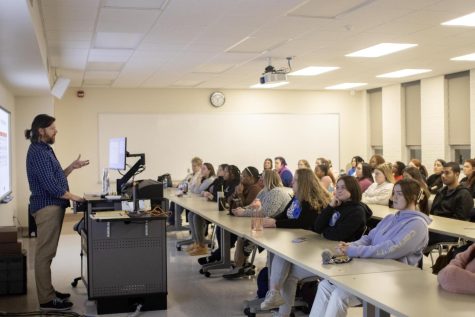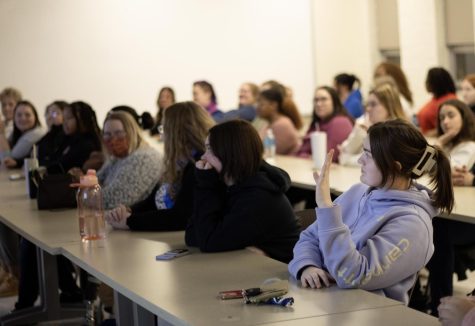Narcan training teaches students about overdose prevention
January 25, 2023
The Eastern Illinois Department of Public Health and Nutrition held a class to teach students how to prevent drug overdoses in Klehm Hall Tuesday night.
The Narcan training was taught by Harm Reduction Program Coordinator, Joe Trotter, where he taught students of all majors the symptoms, causes, and steps necessary to prevent opioid overdoses. These steps included spraying naloxone (Narcan) into the nose of those overdosing.

Those who attended the training were given a certificate confirming their potential to help those at risk of drug overdose.
Associate Professor of Public Health and Nutrition Nikki Hillier said that the number of people who signed up for the training was pleasantly surprising.
“That was very moving for me to see like they care about this,” Hillier said. “There was a student that talked about it being our duty to be able to provide care.”
The unexpected number of students interested in the Narcan training caused some to be on a waitlist waiting for the next training date.
Hillier also said that everyone should learn overdose prevention training despite occupation.
“I thought that was bigger than just nurses need to know how to do this as everyone needs to know about being a fellow human,” said Hillier.
Jill Bowers, the Associate Dean for the College of Health and Human Services, said that learning the ways to help someone at risk of overdose is critical as it can occur anywhere.
“It’s also exciting that we’ll have more people that are trained in Narcan on campus and opioids intervention in case anything would happen,” Bowers said. “Some of the most common places is, you know, in someone’s home or apartment or even in a park or random places.”
Assistant Professor and Honors Coordinator, Lauri DeRuiter-Willems said although some students were at the training as extra credit for a class, they found themselves invested in the steps to save someone when the time comes.
Katie Jara, a sophomore exercise science major, said that she thought the training was very simple but effective.
“I think it was very efficient and I think it should be a requirement for everyone because especially like right now, everyone is talking about on the news how there’s an opioid crisis, Jara said. “And I think it’s just such a simple and easy way to prevent people from dying.”
According to Irina Bezuglova, a junior nutrition and dietetics major, being ready for overdoses is why she went through the training.
“You never know when these emergencies are going to happen and so you better be ready for it when that day comes,” Bezuglova said. “I feel like it’s a good thing that students come here and just go out of their way to come here and learn so that’s a great sign.”

Bezuglova also said there can be a stigma around overdoses and those who use drugs.
“I feel like it was a great point for [Trotter] to bring up that people are not bad just because they use drugs or they had an overdose,” Bezuglova said.
Bezuglova said that despite having some pre-existing ideas about drug overdoses, she learned a different perspective about the topic.
“I always think that people that overdose are the ones who are doing hard drugs and are not productive members of society,” according to Bezuglova. “But when he explained it in the way that it’s like, these people are in an emergency and just because they’re doing drugs does not mean that we should stop giving them support and help and support and prevent them from dying.”
Drew Coffey can be reached at 581-2812 or at [email protected].




















































